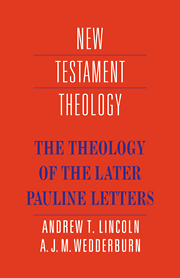Book contents
- Frontmatter
- Contents
- Editor's preface
- Note on citations
- THE THEOLOGY OF COLOSSIANS
- THE THEOLOGY OF EPHESIANS
- 5 Introduction
- 6 The background of the theology of Ephesians
- 7 The theology of Ephesians
- 8 The theology of Ephesians within the Pauline Corpus and the New Testament
- 9 Critical appropriation of the theology of Ephesians
- Guide to further reading — Colossians
- Guide to further reading — Ephesians
- Index — Colossians
- Index — Ephesians
7 - The theology of Ephesians
Published online by Cambridge University Press: 30 October 2009
- Frontmatter
- Contents
- Editor's preface
- Note on citations
- THE THEOLOGY OF COLOSSIANS
- THE THEOLOGY OF EPHESIANS
- 5 Introduction
- 6 The background of the theology of Ephesians
- 7 The theology of Ephesians
- 8 The theology of Ephesians within the Pauline Corpus and the New Testament
- 9 Critical appropriation of the theology of Ephesians
- Guide to further reading — Colossians
- Guide to further reading — Ephesians
- Index — Colossians
- Index — Ephesians
Summary
Any arrangement of the thought of Ephesians runs the danger of becoming abstracted from the writer's own way of thinking and mode of expression and of appearing arbitrary. Yet one does not wish, on the other hand, to have the presentation of the writer's thought become a running mini-commentary by simply following the sequence in the text. These two dangers can be mitigated somewhat by making the determinative framework for our own categories what we have seen to be the writer's main concern, namely, the issue of his readers' identity, and by endeavouring to keep in mind constantly the rhetorical means by which he pursues his goal. So this chapter will explore some of the major symbols and themes of the letter in the context of its purpose of strengthening the self-understanding and promoting the distinctive behaviour of its readers as members of the Church in the world. It will recognize that the letter's three major ways of reinforcing its readers' identity — through the language of worship (thanksgiving and prayer), the language of anamnesis (the recall of the past) and the language of paraenesis (ethical exhortation) — are not only vehicles for this writer's theologizing but also significant elements in the symbolic universe he constructs.
- Type
- Chapter
- Information
- The Theology of the Later Pauline Letters , pp. 91 - 126Publisher: Cambridge University PressPrint publication year: 1993
- 1
- Cited by

